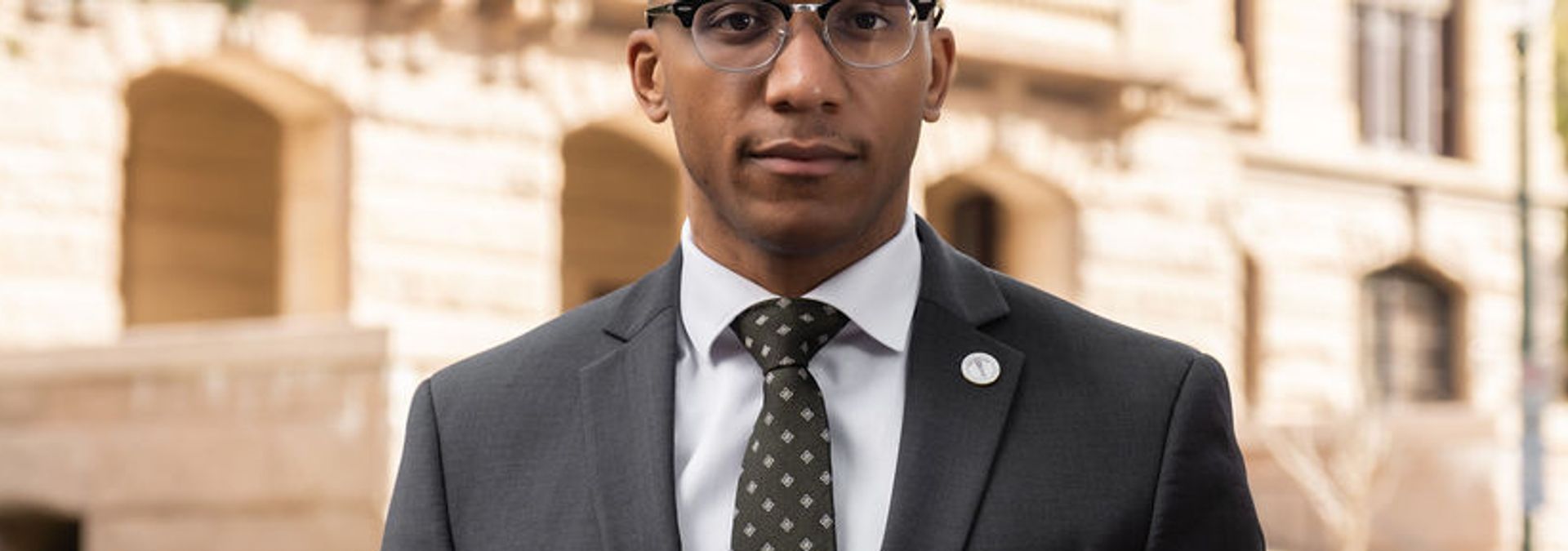
‘Make trouble’: A conversation about servant leadership with Harris County Attorney Christian Menefee
Menefee says, 'We're going to raise hell, we're going to have fights. Sometimes we're going to win, sometimes we're going to lose.'
Christian Menefee, who grew up in Houston, was elected as Harris County attorney in 2020. (His office is separate from the county district attorney and practices civil, not criminal, law.) He’s charged with defending the shared values of people in Harris County. In 2021, he’s been defending many of those interests against the interests of the state.
The historic turnout in Texas during the 2020 election — more people voted during early voting in Harris County than in any previous election overall — was a cause for concern, apparently, leading to bills from Republican leaders looking to restrict some of the very approaches that boosted turnout. The bills, Menefee argued, would disproportionately harm diverse Harris County, including historically Black and Hispanic communities, eliminating, for example, 24-hour voting, which second- and third-shift workers (and some night owls, no doubt) enjoyed.
It’s worth drawing a line from these restrictive bills to the environmental injustices Menefee talks about in the first part of this conversation. The Texas Transportation Commission, all appointed by Gov. Greg Abbott, voted to keep the funding for a freeway widening project through the center of Houston that another lawsuit Menefee filed argues ignores the concerns of local government … and would disproportionately harm diverse Harris County, including historically Black and Hispanic communities.
Maybe you sense a pattern.
After TxDOT had issued a yes-or-no SurveyMonkey to collect feedback, Menefee called it a “sham” and “a false choice.” In an August statement, he said, “Residents deserve a meaningful public input process that allows them to express whether they want the project designed in a way that minimizes the impact to surrounding communities.”
This is the second part of a conversation with him about the role of his office in the state of Texas. You can read the first one, about environmental injustice in Houston, here. Both have been edited and condensed for clarity.
AW: Different communities have different needs have different threats. It's not all the same, all things are not equal. You mentioned Michael Regan at the EPA — he gets it. On paper, the Biden administration gets it. I wanted to ask you about the voting restrictions here in Texas. Rep. Bryan Hughes and those championing these changes keep talking about uniformity: We want to make it the same for everybody. They have this veneer that it's neutral. That ignores everything we know about the differences in access and resources from community to community. How do you build equity with people who pretend inequity isn't even a thing?
CM: Look. I long ago stopped assuming that some of these arguments are being made in good faith. I think the uniformity argument is nonsense. I think that it is a way to ostensibly appear to be helping small businesses when really you're casing for the large-scale industry that operates across the state, and you want them to have the safety of uniformity, so their profit margins don't depend on different regulations in different areas.
Truth be told, I think that many of our state leaders have made clear that in their list of priorities, protecting industry is higher than protecting communities.
Our goal hasn't been so much to earn good will with these folks. Our goal has been, where appropriate, to make trouble.
That’s me driving out to Austin to testify in support of a bill that's going to give local governments the authority to object when a concrete batching plant is applying for a [Texas Commission on Environmental Quality] permit or wading into a permit dispute that the TCEQ would probably prefer that we stay out of. I think that that's our means of being most effective, because you can't negotiate when folks make bad-faith arguments that it should be the same for industry in Houston as it is in Dallas.
One, they're two different cities. Two, Houston doesn't have zoning, so a business making a mistake with the environment can have a far greater impact than it would in some other city. Three, our population is unlike any other city in the state of Texas.
I try to have intellectual arguments, but one of my deputies always reminds me, because I come from the private sector, in this space, you have to get used to the lines being aligned for political reasons. The intellectual debate is just going to frustrate you.
AW: There’s a situation between Harris County, the largest county in the state, with a lot of power, and then lawmakers in Austin. The legislature is kind of using the law as a bludgeon, and you're left in a position where you’ve got to swing back. I don't know that that's sustainable. You’re in a fight to maintain accountability when things proceed in bad faith, but we're both younger people, we're dads. What gives you hope that there's a way to resolve this tension?
CM: I think that optimistically I should think about it that way, but I just really don't. I try to view this as servant leadership, and it's my job to do what's necessary to protect the communities that I think are vulnerable and fight for the things that I feel are important. And then I just kind of let the chips fall where they may.
It's probably not good politics for me in the long term to be suing the governor and the attorney general over the mask mandate prohibitions or TxDOT over the I-45 project, or any of the other many lawsuits that we filed, but it's one of the few tools that they've left me. They have run a coordinated effort over the past decade to weaken local governments, and particularly Harris County. I think the best example of a real turning point in their efforts was when the Speaker of the House [Dennis Bonnen] was caught on tape saying he wanted the next legislative session to be the worst in the history for cities and counties.
They've effectively declared war on cities and counties, and a lot of it's been aimed at Harris County. All the voting stuff? Most of that was designed to undo what Chris Hollins and the elections team did. They have passed laws designed to tie our hands in environmental lawsuits, the types of lawyers we can hire, how much money we can get, so on and so forth. I'm going to continue to fight with the tools that I have, and I take it day by day.
I know that that can sound a little depressing, but for me, it's not. It's actually kind of liberating. You have players at the state who are working against the interest of local communities. In their defense, they're probably largely doing that because that's what their policy dictates, because of the increased polarization that is happening in this country. All of our cards on the table. We're all being transparent for the most part.
I know that for me, as long as I'm fighting for the communities that I'm purporting to serve, I'm going to sleep just fine.
So, we're going to raise hell, we're going to have fights. Sometimes we're going to win, sometimes we're going to lose. I have no qualms about suing the governor and the attorney general over the mask mandate prohibition, because it is abject nonsense.
And I don't have to have any concerns about some smart conservative friend calling me and making a compelling case for what the governor is doing, because even my conservative friends think it's nonsense.
It definitely helps keep our decisions clear. There have been instances where we've partnered with some folks at the state, but ultimately I was elected by the people of Harris County and by communities, which includes Fifth Ward, and Third Ward, and Sunnyside, and Independence Heights, and the East End.
And so I have to do what I have to do for those communities. I'll sleep at night just fine as long as we're doing that.
West is a writer with One Breath Partnership. You can follow him on Twitter @allynwest.
STAY UP TO DATE
The quality of our newsletter is considered satisfactory and poses little or no risk.
SUBSCRIBE

